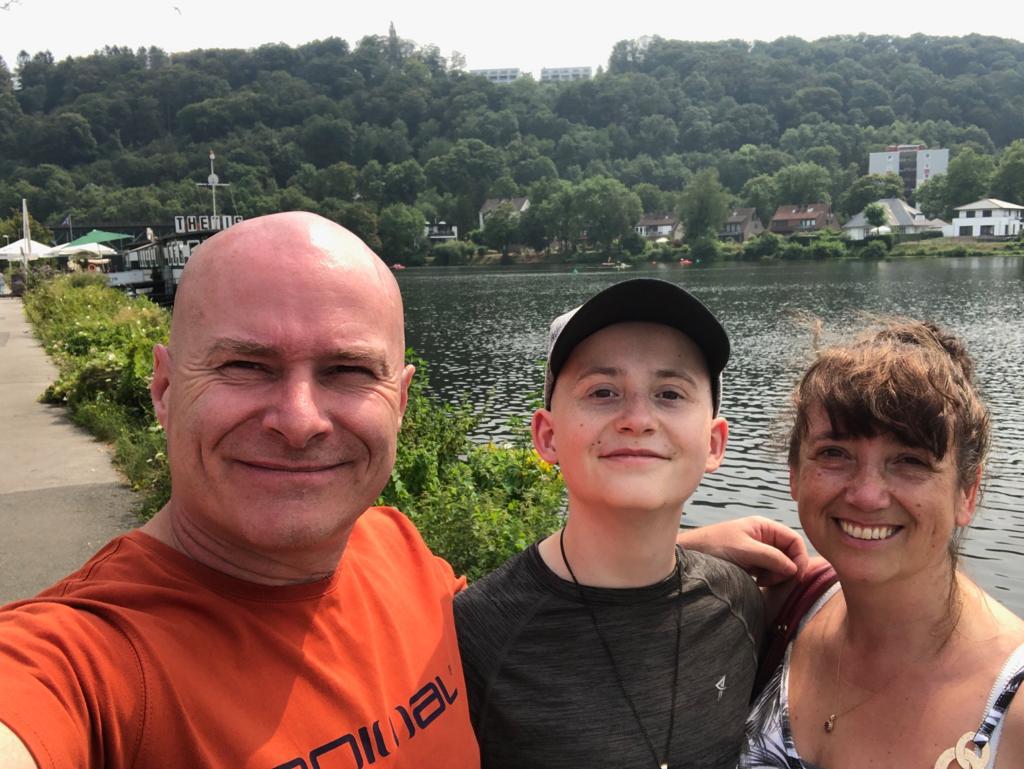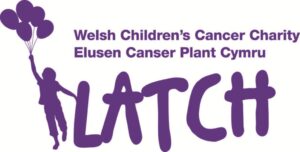A fourteen year old from Burry Port has returned from Germany following successful Proton Beam Therapy to treat four brain tumours, following a lengthy fight for a diagnosis.
Christopher Mullins, who attends Glan-y-Mor School in Burryport, was a typical young teenager – a keen sportsman and dancer and recipient of a coveted Black Belt in Karate, but back in February 2018, his parents Samantha and Kevin noticed that he was drinking large amounts of water – often taking up to three litres to bed with him each night.
Chris was taken to his local GP surgery, and a test for diabetes was conducted, which came back clear. Since Chris had just turned thirteen, it was thought that it might be hormonal.
Fast forward to May 2018, and Chris’s excessive drinking increased – at one stage seeing him get through four litres of pop in a matter of hours during a family holiday to Barcelona. The family kept a watchful eye, but by September his parents noticed he was regularly unable to finish a meal, often bringing his packed lunch home with him with the excuse of not having time or not being hungry.
In October 2018, a family photo was taken and Chris’s appearance shocked his parents who pursued further tests, all of which came back negative. Christmas and New Year passed by, with further blood tests which all came back negative.
School was difficult as Chris simply couldn’t get up in the mornings – sometimes even falling asleep in class. A meeting at the school highlighted Chris’s health issues which led to the school being very supportive, but his weight loss was now so significant that his parents continued to push for a diagnosis at their local GP surgery.
Eventually, Chris’s GP referred him to Glangwili General Hospital where a paediatrician in turn referred him to CAMHS (Child and Adolescent Mental Health Services) where Chris was assigned a Psychologist and Dietician and told to keep a calorific diary. By now, Chris was having severe dizzy spells and double vision. He was then taken out of school as he simply wasn’t fit enough to walk to his lessons.
Chris’s symptoms were diagnosed as psychological, so his parents paid for hypnotherapy treatment which initially helped him to take food into his mouth. The success, however, was short lived, and Chris quickly began losing weight again. At this stage, his Psychiatrist said that it was time for him to go into Glangwili hospital and a referral was made to Ty Llidiard, Bridgend, a clinic for eating disorders.
Mum, Samantha, disagreed with the findings, telling health professionals that he was regularly being sick in front of them and that his behaviour was not that of someone with an eating disorder. Mum felt patronised by the clinical professionals who made her feel like a neurotic mum, telling her, ‘He’s not going to have an easy ride – we won’t be making it easy for him’.
Chris continued to decline whilst at the clinic and was vomiting several times a day, unable to hold down anything but water. He was then admitted into the Princess of Wales Hospital. While there, a Staff Nurse asked ‘what scans has Chris had?’ and the family advised that he’d not been given any throughout the duration of his investigations. An MRI and CT scan quickly followed, where the seriousness of Chris’s condition was discovered and tumours and pressure were spotted in his brain.
A surgical team was immediately arranged at the University Hospital of Wales, Cardiff and, within a short time, a biopsy was taken and fluid was drained which immediately helped with his headaches and dizziness. Within a few hours, Christopher had his first few mouthfuls of food and that evening ate his first meal in three weeks. Two weeks after the biopsy, Chris was diagnosed with cancerous Germinoma tumours and his chemotherapy started soon after.
Following four sessions of chemotherapy, Chris’s family were told that they would need to go out to Essen, Germany as there is currently nowhere in the UK equipped to carry out proton beam therapy on the spine which was required in this case.
With the flight to Germany grounded due to storms, Chris’s parents decided to drive (with a little help from a ferry to Calais) all the way to Germany from the UK!
In the six weeks spent in Germany, Chris received a total of 25 rounds of proton beam therapy. He’s now back in Wales and trying to regain a sense of normality and is building his strength up slowly, but his family know all too well how close they were to having a very different outcome.
Since Chris’s operation, his medical treatment and care at the Children’s Hospital for Wales has been second to none, and the family want to express their deepest gratitude for saving Christopher’s life. They would also like to express their thanks to the local community and businesses for their kindness and generosity during the family’s difficult time.
The family have also been supported by LATCH Welsh Children’s Cancer Charity from the moment of Chris’s diagnosis, and they covered the cost of travel and living expenses whilst the family were in Germany. LATCH also funds transport and hotel costs for siblings in order to avoid family separation at this difficult time which enabled Chris’s loved ones to be close by.
Christopher’s mum, Samantha, said: “I’m indebted to LATCH for the support and guidance we’ve received since the moment we arrived in unfamiliar surroundings at the Children’s Hospital for Wales. The use of their home from home accommodation has been absolutely essential, and we don’t know where we would have even begun to unravel the complex treatment plans and journeys without the support of our LATCH Social Worker, Katie”
She continued: “My only hope in raising awareness of Chris’s story is that I can encourage other parents not to be intimidated by a health professionals’ status when your most precious loved ones are suffering. Trust your instincts and insist on scans and second opinions if you worry, just like we did, that what you’re being told isn’t right. Professionals must listen to patients: you know your child better than anyone else – stand by what you know and fight for them as mistakes can and, as our case shows, do happen.”

